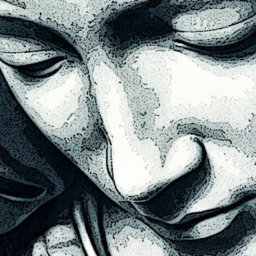 Adam Christopher – an author who follows his amazing stories through whatever genre terrain they lead him (and we follow him cheerfully because… well.. he writes amazing stories) – returns to the Big Chair at the Roundtable to workshop a tale of memory and madness offered by veteran game designer (and player) James Silverstein. James’s story of lost memory, conspiracy, and deceit arrives with a substantial “Awesome” factor in its own right, which sends all of us off in search of even more Literary Gold (spoiler alert: We find it. A LOT of it). Classic Roundtable goodness awaits… (and you simply MUST make the time for Adam’s Showcase Episode because it too is fraught with writerly goodness!)
Adam Christopher – an author who follows his amazing stories through whatever genre terrain they lead him (and we follow him cheerfully because… well.. he writes amazing stories) – returns to the Big Chair at the Roundtable to workshop a tale of memory and madness offered by veteran game designer (and player) James Silverstein. James’s story of lost memory, conspiracy, and deceit arrives with a substantial “Awesome” factor in its own right, which sends all of us off in search of even more Literary Gold (spoiler alert: We find it. A LOT of it). Classic Roundtable goodness awaits… (and you simply MUST make the time for Adam’s Showcase Episode because it too is fraught with writerly goodness!)
PROMO: Indie Author Marketing Info – Independent and self-publication author community
Workshop Episode 35 (Guest Host: Adam Christopher)
[caution: mature language – listener discretion is advised]
Podcast: Download (Duration: 1:10:47 — 48.6MB)
Subscribe: RSS
Check out this and all our episodes on iTunes and on Stitcher Radio!
Adam’s Ensuing Awesomeness…



- “Age Atomic” (sequel to “Empire State“) from Angry Robot Books, May 2013
- “Hang Wire” (also from Angry Robot Books) in 2014
- A dark space opera tentatively titled “Shadows Call” (with Tor) in 2014
- Rumors of a “Sexy, But Troubled” T-shirt are completely unfounded
- In the works… a crime novel, a mainstream thriller with spec elements
Upcoming Conventions for Adam…
- Fantasy Con 2012 (Sept 27 – 30, 2012, Brighton, UK)
- World Con 2013 (Aug 29 – Sept 2, 2013, San Antonio, TX)
- World Fantasy Con (Brighton, UK)



This sounds like a really interesting story. I’ve been listening to this whole podcast for two weeks straight and this one is one of my favorites.
This kept making me think of Memento (in a good way).
I’m very glad you liked the concept. The current writing has hit a tech-based and time-based speed bump, but I’m hoping that by next week things will be back on track.
My question for James is: When you say magic drives people “insane” what does that mean?
Dementia? Delusional? Paranoid? Obsessive Compulsive? Bipolar?
Does every wizard go insane the same way or is it different for each individual?
Especially because of the “surreal” tone you seem to be going for in this story, I think that you need to be clear in your mind how magic drives wizards insane.
I don’t disagree with this comment, but I am wondering what defining the nature of the insanity in advance brings to the table? What do I, as the author, gain by having that specific set of rules, especially if the rule isn’t stated / doesn’t come into play in the first story? (As mentioned- I’m not disagreeing- I’m wondering where you’re coming from with this suggestion).
One of the things that struck me was the need to be able to instill a sense of suspense by showing incremental signs of a wizard in the process of going crazy. You’d mentioned that one of the wizards begins acting “twitchy” at the end, and there’s a possibility that the apartment complex of the damned has other mages in it, so the reader will be looking for some way to identify “mage madness” (because they care, right?)
Also, I would imagine that, if you understand the price something exacts, then understand the thing itself that much better as well. If the magic makes people see things that aren’t there, then that might be a reality distortion. If they become paranoid, that implies some nebulous and sinister forces may be at play. I’m not a psychologist, but the causes of mental dysfunctions might provide an intriguing worldbuilding opportunity with regards to the magic system.
I am surprised that you don’t plan for it to come into play in the first story. I would expect at least one “mentally burned-out wizard” to appear in the story as a warning of what the stakes are.
Given the research you have done on memory, I thought you would also be researching mental disorders.
Part of the reason I ask is that I have friends who are clinically challenged. Mental disorders are not all the same and vague descriptions of “insanity” can lead to harmful stereotypes. I don’t think you would do that intentionally, but it is something that I think would be easier to avoid if you have specific symptoms/behaviors in mind.
Oh, please understand that, as someone who suffers from mental illness of my own, I plan on having realistic underpinnings to the problem itself, and yes, I do plan on having at least one burnt-out in the first story. What I’m wondering about is the necessity of there being rules that are -revealed- in the first story.
No, the rules don’t need to be revealed in the first story. That’s why I said “I think that you need to be clear in your mind how magic drives wizards insane.” If you have the underpinnings well defined for yourself, then the glimpses the reader gets will be consistent.
Ah, okay… Sorry- dunno how I missed that bit. I fully agree. As for an answer to the original statement, yes, I do plan on having a consistency, but I’m not sold yet on what it’s going to be. Do you have any particular thoughts on the matter?
James,
I’m still part way though the podcast, so far I’m not sure I’ll have anything really constructive to add. However you’ve got the pitch down great, as I was listening you drew me in and the whole time I what thinking “darn it isn’t written yet” 🙂
Thank you very much! Trust me when I say, it’s stuff like that which makes me able to continue writing; knowing that I’m not just howling words into the wilderness!